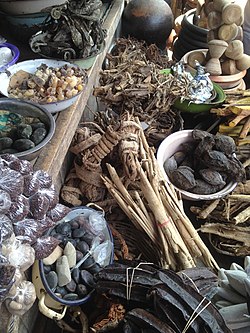
Back Tradisionele Afrika-medisyne Afrikaans الطب التقليدي الإفريقي Arabic Medicina tradicional africana Catalan Traditionelle afrikanische Medizin German Médecine traditionnelle africaine French Tradicijska afrička medicina Croatian Meriana ya setso ya Afrika NSO Medicina tradicional africana Portuguese Традиционная африканская медицина Russian Meriana ya setso ya Aforika Sesotho

| This article is part of a series on |
| Alternative medicine |
|---|
 |
Traditional African medicine is a range of traditional medicine disciplines involving indigenous herbalism and African spirituality, typically including diviners, midwives, and herbalists. Practitioners of traditional African medicine claim, largely without evidence, to be able to cure a variety of diverse conditions including cancer, psychiatric disorders, high blood pressure, cholera, most venereal diseases, epilepsy, asthma, eczema, fever, anxiety, depression, benign prostatic hyperplasia, urinary tract infections, gout, and healing of wounds and burns and Ebola.[1][2]
Diagnosis is reached through spiritual means and a treatment is prescribed, usually consisting of a herbal remedy that is considered to have not only healing abilities but also symbolic and spiritual significance. Traditional African medicine, with its belief that illness is not derived from chance occurrences, but through spiritual or social imbalance, differs greatly from modern scientific medicine, which is technically and analytically based. In the 21st century, modern pharmaceuticals and medical procedures remain inaccessible to large numbers of African people due to their relatively high cost and concentration of health facilities in urban centres.[3]
Traditional medicine was the dominant medical system for millions of people in Africa prior the arrival of the Europeans, who introduced evidence-based medicine, which was a noticeable turning point in the history of this tradition and culture.[4] Herbal medicines in Africa are generally not adequately researched, and are weakly regulated.[5] There is a lack of the detailed documentation of the traditional knowledge, which is generally transferred orally.[6] Serious adverse effects can result from misidentification or misuse of healing plants.[1]
The geographical reach of this article is Sub-Saharan Africa. Though, neighbouring medical traditions have influenced traditional African medicine.
- ^ a b Cite error: The named reference
Helwig2005was invoked but never defined (see the help page). - ^ Cite error: The named reference
Times1was invoked but never defined (see the help page). - ^ Cite error: The named reference
Ubaniwas invoked but never defined (see the help page). - ^ Cite error: The named reference
Abdullahi2011was invoked but never defined (see the help page). - ^ Cite error: The named reference
Mills2005was invoked but never defined (see the help page). - ^ Cite error: The named reference
van Wykwas invoked but never defined (see the help page).